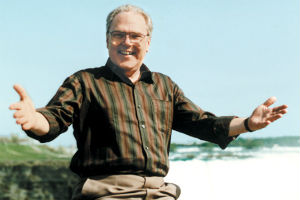Russ Reid, a direct marketing guru and founder of the agency that bears his name, died on Saturday in his Sierra Madre, Calif., home. According to Russ Reid Chairman Tom Harrison, he had been suffering from Parkinson’s Disease but the cause of death was pneumonia. Reid was 82.
“He was a giant in this industry,” said Harrison. “He basically invented a lot of aspects of direct response.”
Reid founded his Pasadena, Calif.-based company in 1964. He retired in 2001 but remained interested in and involved with the agency, according to Harrison. “I met with him once a month for the past 15 years,” he said. The firm, which started in Waco, Texas, now has 300 employees in Pasadena, Fairfax, Va. and Toronto, Ontario, Canada.
During the 1970s, Reid brought to representatives of nonprofit World Vision an idea to create a film about childhood poverty around the world so people would sponsor children. Radio and TV personality Art Linkletter agreed to go on a four-month journey with a film crew. According to Harrison, a World Vision executive asked, “What if this doesn’t work?” Reid is said to have replied, “You’ll have the most expensive church film in history.” It did work, said Harrison. “(Reid) created direct response television,” he said. “We’re still creating work like that for our clients.”
He also successfully implemented direct response television (DRTV) with St. Jude Children’s Research Hospital and Operation Smile. The programs show the real-life victims of poverty, disease or deformity, and the work the organizations do to bring relief to those suffering and introduce positive changes in the lives of the victims.
Harrison also pointed to Reid’s work with Mothers Against Drunk Driving. He talked the founder out of quitting her efforts and did the direct mail acquisition for free. “If it works, we’ll be your agency and change the way America thinks about drunk driving,” Harrison reported Reid as saying. Reid took MADD from zero donors to about 450,000.
In the mid-1980s, the Los Angeles Mission was a small homeless shelter in a rundown building on Los Angeles’ Skid Row. The building was old, inadequate and unsafe. It needed to be retrofitted to protect it and the people it housed from earthquake damage – and the money just wasn’t available. For the first time, a newspaper advertisement was placed in the Los Angeles Times asking for donations to the Mission.
People responded, and donated money to the Mission to help feed, clothe and house the homeless. A larger ad resulted in more new donors, and a direct response fundraising program was born.
Over the next months and years, donors who responded to the initial advertisements were regularly contacted by mail to tell them how their support was helping serve those who came to the Mission for help getting off drugs, alcohol and the streets. These letters resulted in more donations, allowing the program to expand, build a new facility and help even more people.
The program became the model to help hundreds of Rescue Missions and Food Banks across the US and Canada.
“Russ Reid’s innovations have changed the way nonprofits raise money on TV, in the mail and online,” said Harrison.
Reid led the agency through a major transition in 1998 when it was sold to Omnicom, one of the largest marketing corporations in the world. Reid retired from the daily operation of the company in 2001. He also kept close personal relationships with company leaders.
“Anyone who’s had that big of an impact on the industry is a significant loss,” said Allison Porter, president of Avalon Consulting in Washington, D.C.
“In the early 1980s, Russ Reid and I both had a relationship with St. Jude Children’s Research Hospital,” said Herschell Gordon Lewis, direct response expert. “His knowledge and instincts were more than rare. They were extraordinary. We’ve lost a major icon.”
“Russ helped build large organizations such as Mothers Against Drunk Driving, as well as numerous rescue missions across the country who feed and shelter the homeless,” said Chip Grizzard, CEO of Grizzard. “He tirelessly mentored so many industry professionals, many of whom are today’s best thought leaders… Today his legacy lives on through those he touched. A true legend and icon.”
“This is a sad day … his name and his legacy are known and felt throughout the fundraising community,” said Senny Boone, senior vice president, corporate and social responsibility, of the Direct Marketing Association in New York City. Reid mentored many fundraising professionals who are active with the Direct Marketing Association Nonprofit Federation, said Boone. “The fundraising community has sadly lost another giant and we mourn his loss, we hope to find ways to ensure his work is not forgotten.”
Reid’s passion was rescue missions. “He was the most generous person I knew, sometimes to a fault,” said Harrison. Harrison said Reid once told him, “If I could have done anything else, I would run a rescue mission because it makes the most difference for people who are the least, the last and the lost.”
Reid is survived by his wife, Cathie, two sons, two daughters, and eight grandchildren.
